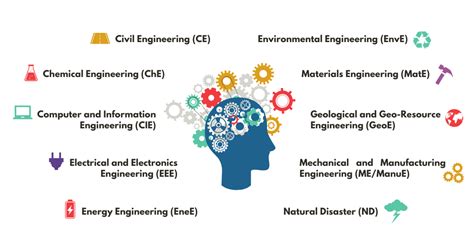Engineering is a challenging but rewarding field that offers a wide range of career opportunities. However, it is important to be aware of the academic rigors involved before pursuing an engineering degree.

Academic Rigor
Engineering programs are typically rigorous and demanding, requiring students to possess strong math and science skills. According to the American Society for Engineering Education (ASEE), engineering students spend an average of 15-20 hours per week studying outside of class.
Math and Science Proficiency
Engineering students must have a solid foundation in mathematics and science, including:
- Calculus
- Differential equations
- Physics
- Chemistry
These subjects provide the theoretical framework for understanding engineering concepts and solving engineering problems.
Problem-Solving and Critical Thinking
Engineering involves solving complex problems and making critical decisions. Students must be able to:
- Analyze and interpret data
- Develop creative solutions
- Communicate their ideas effectively
Design and Innovation
Engineering is also about designing and creating new technologies. Students will learn to use engineering design principles and software to develop innovative solutions to real-world problems.
Time Commitment
Engineering programs typically take four to five years to complete. Students should expect to spend long hours studying, attending lectures, completing assignments, and working on projects.
Classwork and Homework
Engineering students have a heavy workload, with multiple classes and assignments each semester. They should expect to spend several hours per day outside of class completing readings, homework, and projects.
Labs and Projects
Engineering programs also involve extensive laboratory work and project-based learning. Students will spend significant time conducting experiments, building prototypes, and working on group projects.
Common Mistakes to Avoid
To succeed in an engineering program, it is important to avoid common mistakes, such as:
- Underestimating the workload: Engineering programs are demanding, and students should be prepared for a significant time commitment.
- Neglecting math and science: Engineering students need a strong foundation in math and science to succeed.
- Ignoring deadlines: Engineering assignments and projects have strict deadlines that must be met.
- Not seeking help when needed: Engineering students should not hesitate to ask for help from professors, classmates, or tutors when they need it.
Why Engineering Matters
Engineering is a vital field that plays a crucial role in modern society. Engineers design and build the infrastructure, technologies, and products that we rely on every day.
Infrastructure and Transportation
Engineers design and build bridges, roads, airports, and other infrastructure that connects communities and enables transportation.
Energy and Environment
Engineers develop sustainable energy solutions, improve energy efficiency, and protect the environment.
Healthcare
Engineers create medical devices, develop new treatments, and design hospitals and healthcare facilities.
Technology
Engineers design and develop cutting-edge technologies, such as artificial intelligence, robotics, and autonomous vehicles.
Benefits of an Engineering Degree
An engineering degree opens doors to a wide range of career opportunities in both private industry and the public sector. Engineers are in high demand, and they command competitive salaries.
Career Opportunities
Engineering graduates can work in various fields, including:
- Aerospace engineering
- Civil engineering
- Chemical engineering
- Computer engineering
- Electrical engineering
- Mechanical engineering
Salary and Job Outlook
According to the U.S. Bureau of Labor Statistics (BLS), the median annual salary for engineers was $100,640 in May 2021. The BLS projects that employment of engineers will grow 7% from 2020 to 2030, faster than the average for all occupations.
FAQs
1. Is engineering harder than medicine?
Engineering and medicine are both challenging fields with demanding academic programs. However, the specific difficulty of each field depends on individual strengths and interests.
2. What is the hardest year of engineering school?
The first year of engineering school is typically the most difficult, as students adjust to the rigorous coursework and heavy workload.
3. What is the failure rate for engineering students?
The failure rate for engineering students varies by program and university. However, the national average is around 20%.
4. What is the most difficult engineering degree?
According to surveys conducted by ASEE, the most difficult engineering degrees are:
- Aerospace engineering
- Chemical engineering
- Computer engineering
- Electrical engineering
- Mechanical engineering
5. What are the best engineering schools?
According to the U.S. News & World Report, the top engineering schools in the United States include:
- Massachusetts Institute of Technology (MIT)
- Stanford University
- University of California, Berkeley
- University of Michigan, Ann Arbor
- Georgia Institute of Technology
6. What are the best jobs for engineers?
The best jobs for engineers are those that align with their interests and skills. Some of the most popular engineering jobs include:
- Software engineer
- Electrical engineer
- Mechanical engineer
- Civil engineer
- Aerospace engineer
7. What is the future of engineering?
The future of engineering is bright, with new technologies and applications emerging constantly. Some of the most exciting areas of growth include:
- Artificial intelligence
- Robotics
- Autonomous vehicles
- Sustainable energy
- Biomedical engineering
8. What is a “createch”?
A “createch” is a creative engineer who develops innovative technologies that meet emerging needs. Createchs are often driven by a passion for solving real-world problems and creating positive change.
